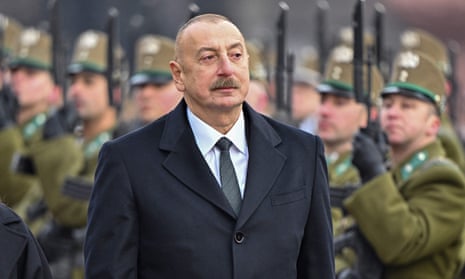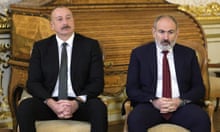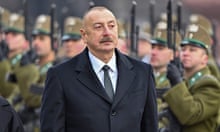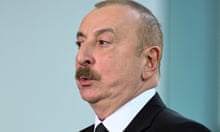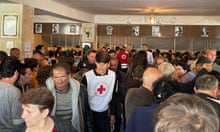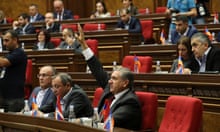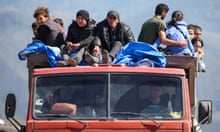Azerbaijan’s military victory in the extended 35-year conflict over the disputed territory of Nagorno-Karabakh is a notable geopolitical setback for Russia, traditionally Armenia’s partner and ally.
Moscow’s post-Soviet strategy has often been to stoke conflicts to weaken its near neighbours, creating crises in Ukraine, Moldova and Georgia. But on this occasion the Kremlin has had to adapt to Azerbaijan’s rising power – showing a willingness to sacrifice an old ally.
At the beginning of the month, before the current crisis, Nikol Pashinyan, Armenia’s prime minister, rued that his country’s historic “99.999%” dependence on Russia as security partner had amounted to “a strategic mistake”.
By then it had long been clear Russia had become embroiled in a quagmire in Ukraine – and so would be unable to prevent Azerbaijan from finally regaining control of an enclave of territory in ethnic Armenian hands over which it had wanted to assert control since the fall of the Soviet Union.
“Russian resources are clearly finite,” said James Nixey, a Russia expert with the Chatham House thinktank. “Karabakh is clearly an issue of lesser importance to Moscow, it is not a place like Crimea or Syria from which it is possible to project force.”
“In a way, Russia chose the wrong country,” said Neil Melvin, a director at the Royal United Services Institute thinktank. “Azerbaijan is much closer to Russia: the two share a border. It is clear who is now the dominant force in the south Caucasus, and looks like it wants to align to them.”
Azerbaijan is a larger, wealthier country than Armenia and an autocracy, like Russia. The country’s economy, supported by large oil and significant gas reserves, is able to afford a more powerful military – its $2.64bn (£2.16bn) defence budget is 3.5 times its neighbour’s in dollar terms, according to figures from the International Institute for Strategic Studies.
Baku had already formed an effective alliance with Turkey that provided the Bayraktar TB2 drones that helped it win the last war in 2020, a 44-day autumn conflict in which Azerbaijan took control of the skies, bombing Armenia’s Soviet-era tanks and its allies in Nagorno-Karabakh.
It recaptured territories lost in 1994 and in the ensuing peace left only the core of Nagorno-Karabakh in ethnic Armenian hands, with nearly 2,000 Russian peacekeepers in place to control the borders and the protect the small Lachin corridor to Armenia proper.
But in the run-up to the Ukraine war, Azerbaijan also turned to Moscow. Its president, Ilham Aliyev, whose father was once a KGB official and a politburo member, travelled to Moscow two days before the invasion to sign an alliance agreement with Vladimir Putin. Azerbaijan later agreed to buy gas from Russia, raising questions whether it was using that to meet commitments to the EU.
Azerbaijan’s latest attack last week on Nagorno-Karabakh lasted only 24 hours. During the assault, a number of Russian peacekeepers were killed by Baku’s forces. Aliyev rang the Kremlin to apologise the next day, and the matter appears largely closed without Moscow making any significant complaint.
South of Azerbaijan lies Iran, one of Russia’s few close allies, and the three countries agreed in May they would build a new rail corridor along the Caspian Sea, although claims from Мoscow that it could create a trade route to rival that of the Suez Canal seem notably optimistic.
Armenia’s prime minister, meanwhile, has complained that the Moscow-dominated six-country Collective Security Treaty Organization (CSTO) did not come to its aid, and some hope that it will now try to pivot to the west. Its parliament will now consider signing up to the international criminal court, which, if ratified, could prevent Putin, because he is indicted by The Hague, from visiting.
But that is a long way from Yerevan turning to the EU and Nato. “Look at the difficulties Ukraine is having joining the EU and Nato. A country like Armenia has no chance,” Nixey said. With a long-established Russian base, Gyumri, to protect it from Turkey to the west, a rapid realignment is impossible.
Russia’s inability or lack of desire to protect Armenia may not have any major implications for other post-Soviet frozen conflicts, because the countries involved have less power than Azerbaijan or simply less hostility to Moscow.
Magomed Torijev, a journalist and expert on the Caucasus region, said Georgia’s government was “increasingly friendly with Russia”, with no strong interest in trying to reclaim either South Ossetia or Abkhazia, while Moldova, with its own Transnistria separatists, was not ready to challenge the Kremlin.
In other countries, such as Syria, Russia’s alliance with the governing regime will help protect its position, and Moscow’s presence is likely to endure unless it is directly challenged. But what has changed, experts say, is that stronger countries such as Ukraine and Azerbaijan are willing and able to challenge Russia as never before.
“The reality is that Russia has been weakening for some time,” Melvin said.
